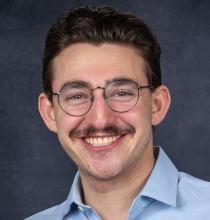
Provide a brief paragraph describing your field and the focus of your research:
I am researching the neutrino, one of the most elusive particles in our universe. As experimental particle physicists, we believe that understanding the fundamental nature of these tiny ghost particles holds the keys to learning about the early universe and some of the most compelling problems unanswered by the Standard Model, including why our universe is dominated by billions times more matter than antimatter. I work on developing computational simulation and analysis tools for the DUNE 2x2 Near Detector prototype, as part of a 1500+ member international collaboration. While I was a physics and applied math undergrad at RPI, I worked with Prof. Ethan Brown for a year on the nEXO neutrinoless double-beta decay experiment, which I continued on for an additional 8 months at Lawrence Livermore National Laboratory as part of the DOE SULI program.
What is your vision for your future; what do you expect to be doing after your fellowship?
I am currently pursuing a PhD in physics at the California Institute of Technology (Caltech) as a 2024 NSF GRFP recipient. After finishing my PhD, I hope to further my career as an experimental particle physicist at a national lab or university. I have high aspirations of becoming a leader in my field, contributing to a scientific collaboration or national laboratory by leading a group of fellow researchers. I also continue to participate in and advocate for programs to improve the culture within scientific research, with a particular emphasis on undergraduate research opportunities, mentorship programs, and accessibility for all, leveraging my personal experience with Type 1 Diabetes.
What do you anticipate most about your fellowship experience?
The impact of receiving the NSF GRFP award on my future will be substantial. Receiving external funding will motivate additional opportunities for travel for outreach and scientific collaboration, which is one of my favorite parts of my field of study. Additionally, the need to fund myself as a teaching assistant being removed will give me the freedom to partake in more directed scientific outreach and teaching opportunities. Lastly, the prestige of this award will follow me throughout my career and furthers my net potential.
What advice do you give to current students considering applying to fellowship programs?
Applying to fellowships is always a good idea. The fellowship office at RPI (shout out to Betty!) is exceptional and will connect you with resources to identify, strategize, and apply for fellowships that will provide you a world of opportunity. Particularly when applying to NSF GRFP, try to apply as an undergrad, this will give you experience towards potentially applying again as a graduate student and will help you develop the skills you will utilize when applying to graduate programs and other fellowships. Fostering strong relationships with letter writers is essential for your success and should never be neglected. You will never craft the perfect application, so take your time, seek help from others, and avoid the outside anxiety of forums such as gradcafe that will forecast gloom and doom - these sites always have selection bias! And of course, try your best and good luck!
